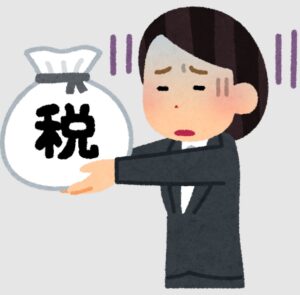管理人オススメコンテンツはこちら
「手段と目的がぐちゃぐちゃ|保険料控除で節税?それ、本当に得してる?」
〜前回のつづき〜
●本当に効果のある節税方法ランキング解説
まず第6位ですね。
『保険料控除』(オススメ度★☆☆☆☆)
下記3種類の保険に加入すると
支払った保険料に応じて
税金が安くなるんですね。
(1)生命保険
(2)介護医療保険
(3)個人年金保険
いくら保険料を払うと
どのぐらいの金額が
節税になるのかというと
細かい計算をすると
非常に複雑になるので
最大効率で節税出来る事例を
紹介してみたいと思います。
例えば
まず生命保険に加入して
年8万円の保険料を払う。
それから
介護医療保険ですね。
がん保険のようなものに加入して
年8万円の保険料を払う。
個人年金保険に加入して
年8万円の保険料を払う。
合計でジャスト24万円
保険料を払う。
そうすると
平均年収のサラリーマンの場合
年1万9千円の
節税になるんですね。
1ヶ月あたり1500円ぐらい。
なので40年で
約80万円の節税になる
という事になるんですけど
ただ今までのお話しの中でも
何度も言ってきてるように
保険というのは基本的に
・掛け捨ての生命保険
・自動車保険
・火災保険
これらしかいらないという
お話しをしてきました。
医療保険や個人年金はいらないし
生命保険料に年8万円もいらない
というお話しをしてきました。
なので注意すべきは
無駄な保険料を払いながら
節税しても意味が無い
という事なんです。
節税有りきで
保険に入るというのは
非常にナンセンスだし
おかしいという事です。
手段と目的が
ぐちゃぐちゃなんですね。
なので
無駄な保険料を払いながら
節税しても意味が無いので
節税の為に
保険に入るんじゃなくて
本当に必要な
最低限の保険に入った。
その結果として
保険料控除が使えるから
節税になった。
これならOK
という話なんですよ。
個人年金の加入検討に関しては
これは節税効果の計算を
間違えないようにしてください。
私としては
個人年金保険を
全く薦めてません。
実際返戻率が
100%超えてたり
年の利回りが
節税効果も加味すると
5%になりましたけどとか
そういう人も
いるかもしれないですけど
#122 もうだまされない!個人年金保険の節税効果を考慮した「正しい保険の見極め方」〜1〜
↑こちらでお話ししてます。
個人年金保険を
私はおすすめしてません。
ただ
どうしても必要という方で
必要最低限の保険しか入ってなくて
保険料控除を使ってない
という人は
使って欲しいと思います。
〜〜〜つづく〜〜〜
Special Thanks college president Ryo.
●おまけ
≪≪Chat-GPTくんによる要約→perplexityちゃんによる文章まとめ≫≫
保険料控除による節税は、生命保険・介護医療保険・個人年金保険の3種類の保険に加入し、支払った保険料に応じて所得税や住民税が軽減される仕組みです。例えば、各保険に年8万円ずつ、合計24万円の保険料を支払った場合、平均年収のサラリーマンなら年間約1万9千円、40年で約80万円の節税効果が期待できます。
しかし、節税目的で不要な保険に加入するのは本末転倒であり、最低限本当に必要な保険だけに加入し、その結果として控除を利用するのが望ましいとされています。特に個人年金保険は節税効果を過大評価しやすく、著者は基本的におすすめしていません。
つまり、節税のために保険に入るのではなく、必要な保険に入った結果として控除が使える場合に活用するのが賢明です。
Citations:
[1] https://www.fukoku-life.co.jp/about/information/hokenryokojo/sim_2/
[2] https://www.smbc.co.jp/kojin/money-viva/money-jiten/0052/
[3] https://ios-moneyseminar.jp/column/insurance07.html
[4] https://japan-who.or.jp/participation/donation/savetax/
[5] https://ins.minkabu.jp/columns/deducation-care-insurance-230825
[6] https://www.resonabank.co.jp/kojin/column/hoken/column_0009.html
[7] https://www.moneypro.jp/columns/life/1913/
[8] https://www.navinavi-hoken.com/articles/personal-pension-deduction
[9] https://www.invest-concierge.com/posts/how-to-save-tax-with-insurance
[10] https://life.insweb.co.jp/nenkin/setsuzei.html
[11] https://www.rakuten-card.co.jp/minna-money/insurance/life_insurance/article_2109_00001/
[12] https://hoken-eshop.com/column/personal_annuity_insurance_2/
[13] https://www.jili.or.jp/knows_learns/basic/tax/22.html
[14] https://www.manulife.co.jp/ja/individual/about/insight/column/article/column120.html
[15] https://tmn-anshin.net/useful/column/detail.html?name=dmp_zuu2409
[16] https://bizarq.group/column2/036/
[17] https://www.mmea.biz/36883/
[18] https://manekomi.tmn-anshin.co.jp/hoken/17613044
[19] https://www.sonylife.co.jp/land/blog/column002.html
≪≪Chat-GPTくんによる英訳≫≫
~ Continuation from last time ~
【Explanation of Truly Effective Tax-Saving Methods: Ranking】
Let’s start with No. 6 on the list.
“Insurance Premium Deduction” (Recommendation Level: ★☆☆☆☆)
If you enroll in the following three types of insurance, you can reduce your taxes based on the amount of premiums you pay:
1. Life insurance
2. Long-term care/medical insurance
3. Private pension insurance
Now, how much tax can you save depending on how much you pay in premiums?
The calculations can get very complicated, so I’ll show you an example of the most efficient tax-saving case.
For instance:
Enroll in life insurance and pay ¥80,000 per year.
Then enroll in long-term care/medical insurance—such as cancer insurance—and pay another ¥80,000 per year.
Finally, enroll in a private pension plan and pay ¥80,000 per year.
This totals exactly ¥240,000 in insurance premiums annually.
For an average salaried employee, this results in a tax saving of about ¥19,000 per year—roughly ¥1,500 per month.
Over 40 years, that would amount to a tax saving of approximately ¥800,000.
However, as I’ve mentioned many times before, when it comes to insurance, basically:
Term life insurance
Auto insurance
Fire insurance
These are the only types you really need.
Medical insurance and private pensions are unnecessary, and you don’t need to pay ¥80,000 a year for life insurance either.
So what you need to be cautious about is:
There’s no point in saving on taxes if it means paying for unnecessary insurance premiums.
Getting insurance just for the tax benefits is completely misguided and senseless.
It’s a case of confusing means and ends.
Therefore, you shouldn’t get insurance for the sake of saving taxes.
Instead, you should only get the minimum necessary insurance.
Then, as a result, if you’re able to claim the insurance premium deduction and save on taxes, that’s perfectly fine.
That’s the right approach.
As for considering whether to join a private pension plan, be very careful not to miscalculate the tax benefits.
Personally, I do not recommend private pension insurance at all.
Some people might say:
“The return rate exceeds 100%,” or
“The annual yield, including tax savings, reaches 5%,”
…and that may be true for some.
I cover this topic in more detail in:
#122: “Don’t Be Fooled Anymore! The Correct Way to Evaluate Private Pension Insurance Considering Tax Benefits – Part 1”
↑ Refer to this for more information.
Again, I do not recommend private pension insurance.
However, for those who truly need it, and are only enrolled in the absolute minimum necessary insurance but haven’t yet taken advantage of the insurance premium deduction, then yes—you should make use of it.
Special Thanks OpenAI and Perplexity AI, Inc








